Global Tapestry
0.0(0)
0.0(0)
Card Sorting
1/86
Earn XP
Description and Tags
Study Analytics
Name | Mastery | Learn | Test | Matching | Spaced |
|---|
No study sessions yet.
87 Terms
1
New cards
Grand Canal
The 1,100-mile (1,700-kilometer) waterway linking the Yellow and the Yangzi Rivers. It was begun in the Han period and completed during the Sui Empire. United China for the first time, made trade and commerce easier.
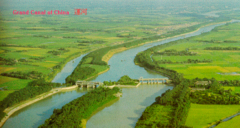
2
New cards
Filial piety
Respect and obedience for older male relatives
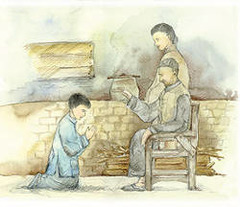
3
New cards
Decline of Buddhism in China
Tang Dynasty attacked monasteries because they did not pay taxes; began to be seen as a foreign and destabilizing effect on China
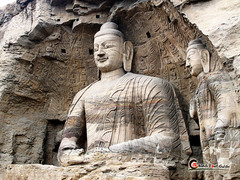
4
New cards
Paper Money
Chinese innovation, helped make trade along the silk road easier.
5
New cards
Innovations during the Song Dynasty
Paper Money, Magnetic Compass, Porcelain Ceramics, Iron & steel industry, Gun Powder, Printing(movable type), Ship Building
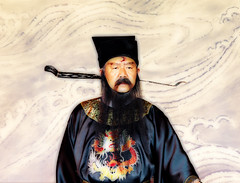
6
New cards
Champa Rice
Quick-maturing rice that can allow two harvests in one growing season. introduced to China as a tributary gift from Vietnam, lead to population increase
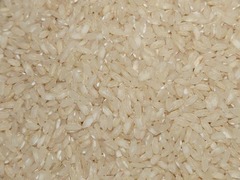
7
New cards
Examples of female subordination during the Song
neo-Confucian laws favored men in inheritance, divorce and family interactions, women excluded from education & the civil service exam, Foot Binding assured that women could not venture far from home & their lives managed by husbands & male guardians
8
New cards
Genghis Khan
Fierce Warrior who united the Mongol clans and conquered much of Asia.
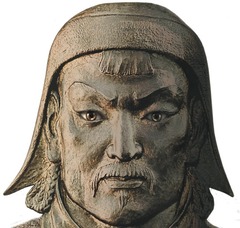
9
New cards
Batu Khan
Mongol leader, Genghis Khan's grandson. Attacked Kiev, killed almost everyone. Renamed Russia The Khanate of the Golden Horde.
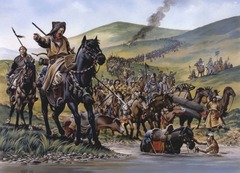
10
New cards
Marco Polo
Venetian merchant and traveler who served in Kublai Khan's Court. His accounts of his travels to China offered Europeans a firsthand view of Asian lands and stimulated interest in Asian trade.
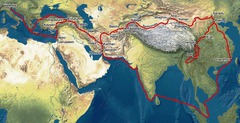
11
New cards
Kublai Khan
Grandson of Genghis Khan, Mongol ruler, he completed the conquest of China and founded the Yuan dynasty, he preferred to live in a palace
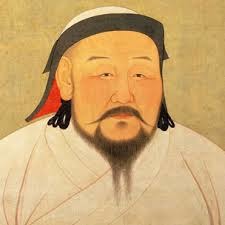
12
New cards
Yuan Dynasty
Chinese dynasty ruled by the Mongols from 1279 to 1368; best known ruler was Kublai Khan
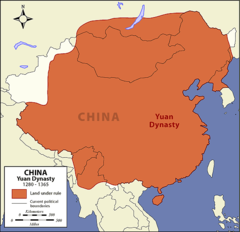
13
New cards
Pax Mongolica
The period of approximately 150 years of relative peace and stability created by the Mongol Empire.
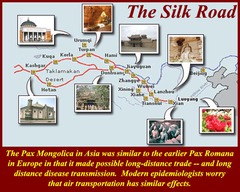
14
New cards
Black Death
The common name for a major outbreak of plague that spread across Asia, North Africa, and Europe. Killed 1/3-1/2 people of Europe; helped eliminate serfdom
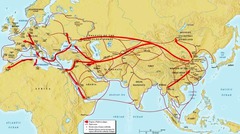
15
New cards
Maya
Mesoamerican civilization concentrated in Mexico's Yucatan Peninsula and in Guatemala and Honduras. Major contributions were in mathematics, astronomy, clearly delineated social classes, and practiced human sacrifice. Highly decentralized which helped led to their downfall.
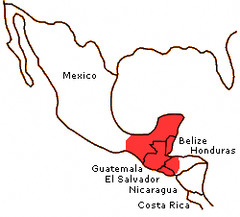
16
New cards
Teotihuacan
first major metropolis in Mesoamerica, collapsed around 800 CE. It is most remembered for the gigantic pyramid of the sun and the Moon are among the largest masonry structures ever built; 125000 people at its height
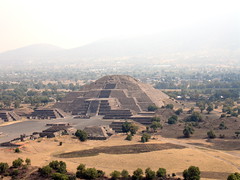
17
New cards
Tenochtitlan
Capital of the Aztec (Mexica) Empire, located on an island in Lake Texcoco. Its population was about 150,000 on the eve of Spanish conquest. Mexico City was constructed on its ruins.
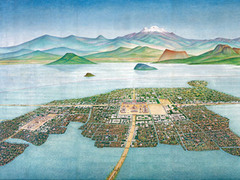
18
New cards
Mexica/Aztec Empire
A large and complex Native American civilization in modern Mexico and Central America that possessed advanced mathematical, astronomical, and engineering technology. Centralized power structure
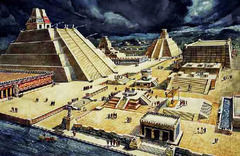
19
New cards
Chinampas
Floating gardens built by the Aztecs (Mexica) that made it possible to sustain a large population
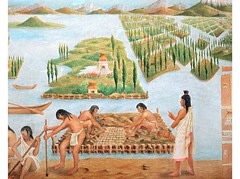
20
New cards
Aztecs (Mexica, tribute system)
imposed on conquered peoples, who had to contribute maize, beans, and other foods and their lives o support Tenochtitlan.
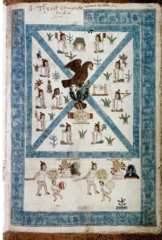
21
New cards
Inca
Largest and most powerful Andean empire. Controlled the Pacific coast of South America from Ecuador to Chile from its capital of Cuzco. On the eve of Spanish invasion, largest empire in the world
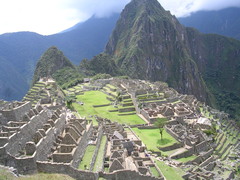
22
New cards
Mita System
economic system in Incan society where people paid taxes with their labor and what they produced. Basis/justification for later encomienda system of the Spanish
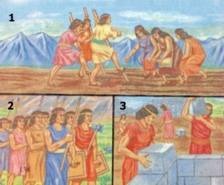
23
New cards
khipu
An intricate system of knotted and colored strings used by early South American cultures (Inca) to store information such as census and tax records
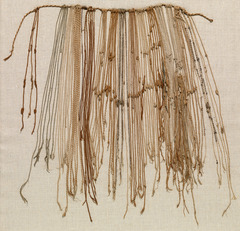
24
New cards
Pope Urban II
Leader of the Roman Catholic Church who asked European Christians to take up arms against Muslims, starting the Crusades
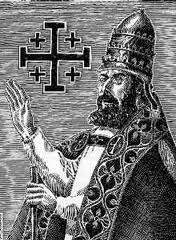
25
New cards
Saladin
The leader of the Muslims in the third crusade and captured Jerusalem in 1187.
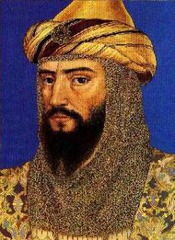
26
New cards
Venice and Genoa
Italian city-states that grew wealthy in trade with the Arab East during and after the crusades
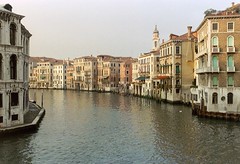
27
New cards
Usury
the charging of interest for the use of money

28
New cards
Byzantine Empire
Historians' name for the eastern portion of the Roman Empire from the fourth century onward, taken from 'Byzantion,' an early name for Constantinople, the Byzantine capital city. The empire fell to the Ottomans in 1453.
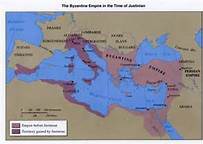
29
New cards
Abbasid Caliphate
Descendants of the Prophet Muhammad's uncle, al-Abbas, they overthrew the Umayyad Caliphate and ruled an Islamic empire from their capital in Baghdad (founded 762) from 750 to 1258.
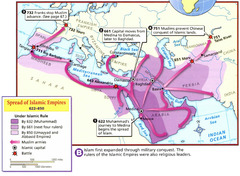
30
New cards
Sufism
mystical Muslim group that believed they could draw closer to God through prayer, fasting, & simple life. Sufi missionaries played an important role in the spread of Islam
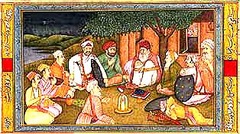
31
New cards
Dar al-Islam
an Arabic term that means the "house of Islam" and that refers to lands under Islamic rule
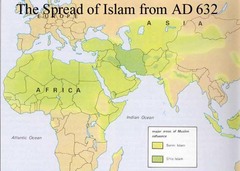
32
New cards
House of Wisdom
An academic center for research and translation of foreign texts that was established in Baghdad in 830 C.E. by the Abbasid caliph al-Mamun.
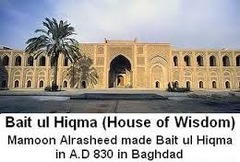
33
New cards
Ethiopia
A Christian kingdom that developed in the highlands of eastern Africa under the dynasty of King Lalaibela; retained Christianity in the face of Muslim expansion elsewhere in Africa
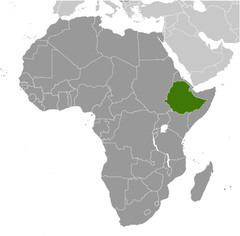
34
New cards
Great Zimbabwe
City, now in ruins whose many stone structures were built between about 1250 and 1450, when it was a trading center and the capital of a large state. Fell due to overgrazing
35
New cards
Songhai
Empire that replaced Mali in the late fifteenth century. Powerful trade empire along the Niger River (Gold)
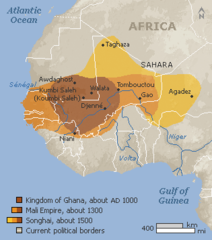
36
New cards
Mali
The kingdom in West Africa that followed the Kingdom of Ghana; its wealth is also based on trans-Saharan trade; this kingdom encouraged the spread of Islam.
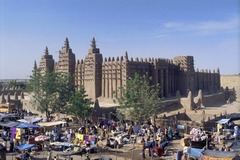
37
New cards
Ghana, Mali, Songhai
West African kingdoms that built wealth and power through trans-Saharan trade of salt and gold
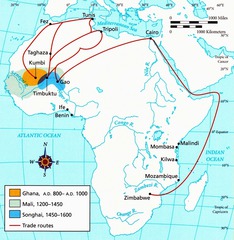
38
New cards
Mansa Musa
1312-1337-Emperor of the kingdom of Mali in Africa. He made a famous extravagant pilgrimage to Mecca- passing out gifts and gold, spreading Islam, and establishing trade routes to the Middle East.
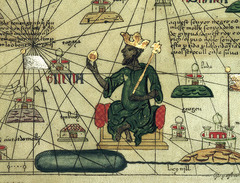
39
New cards
Ibn Battuta
Moroccan Muslim scholar, the most widely traveled individual of his time. He wrote a detailed account of his visits to Islamic lands from China to Spain and the western Sudan.
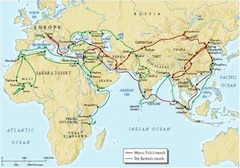
40
New cards
Delhi Sultanate
The first Islamic government established within India from 1206-1520. Controlled a small area of northern India and was centered in Delhi.
41
New cards
Consequences of interregional Trade
Technological diffusion ex: gunpowder, Spread of disease ex: Black Death, Demographic changes ex: growth of urban centers
42
New cards
Hagia Sophia
the Cathedral of Holy Wisdom in Constantinople, built by order of the Byzantine emperor Justinian. Most famous example of Byzantine architecture
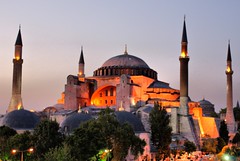
43
New cards
Civil Service Exam
In China, it was an exam based on Confucian teachings that was used to select people for various government service jobs in the bureaucracy. Emphasis on morality and filial piety
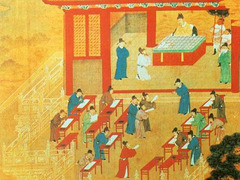
44
New cards
Magna Carta
(1215) a charter of liberties (freedoms) that King John "Lackland" of England was forced to sign; it made the king obey the same laws as the citizens of his kingdom
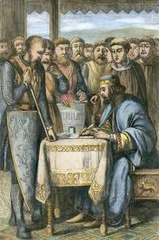
45
New cards
Feudalism
A political system in which nobles are granted the use of lands that legally belong to their king, in exchange for their loyalty, military service, and protection of the people who live on the land
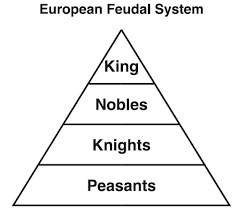
46
New cards
Serfdom
A type of labor commonly used in feudal systems in which the laborers work the land in return for protection but they are bound to the land and are not allowed to leave or to peruse their a new occupation. This was common in early Medieval Europe as well as in Russia until the mid 19th century.
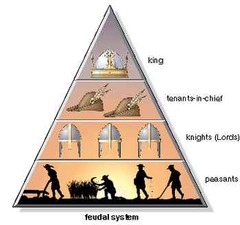
47
New cards
Seljuk Turks
nomadic Turks from Asia who conquered Baghdad in 1055 and allowed the caliph to remain only as a religious leader. they governed strictly
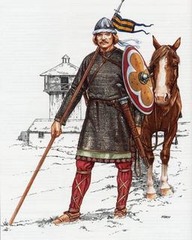
48
New cards
Song Dynasty
During this Chinese dynasty (960 - 1279 AD) China saw many important inventions. There was a magnetic compass; a navy; Increase trade-(brought pepper and cotton); paper money, gun powder; increase in Agricultural productivity (Champa rice) landscape black and white paintings, cast iron goods, steel porcelain, widespread use of woodblock printing
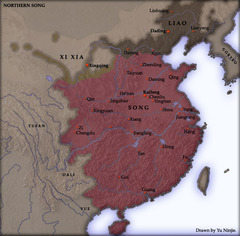
49
New cards
Heian Period
The era in Japanese history from A.D. 794-1185, arts and writing flourished during this time (The Tale of Genji)
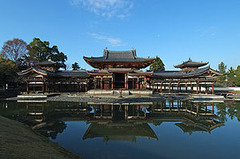
50
New cards
Zen Buddhism
A Japanese school of Mahayana Buddhism that emphasizes enlightenment through meditation and stresses simplicity and discipline.a emphasizing the value of meditation and intuition. Known as Chan Buddhism in China; stressed meditation and the appreciation of natural and artistic beauty
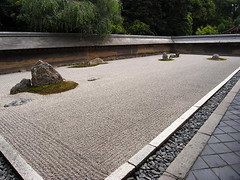
51
New cards
Egyptian Mamluks
Arabs often purchased enslaved peoples, or Mamluks, who served as soldiers and later bureaucrats. In 1250 Mamluks seized control in Egypt establishing the Mamluk Sultanate (1250-1517) They facilitated trade in cotton and sugar between the Islamic world and Europe
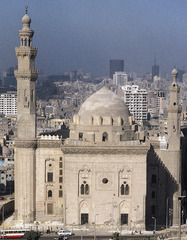
52
New cards
Rajput Kingdoms
Set of kingdoms in India that arose after the fall of the Gupta dynasty in Northern India. There were hundreds of kingdoms ruled by land owning Kshatriyas.
The lack of a centralized power left the kingdoms vulnerable to Musim attacks
The lack of a centralized power left the kingdoms vulnerable to Musim attacks
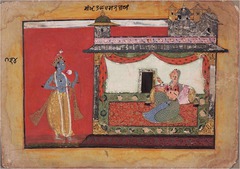
53
New cards
Syncretism
a blending of beliefs and practices from different religions into one faith
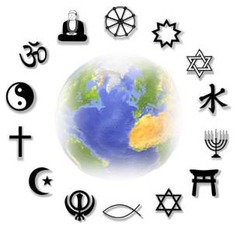
54
New cards
Bhakti Movement
Indian movement that attempted to transcend the differences between Hinduism and Islam
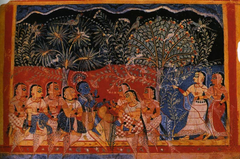
55
New cards
Khmer Empire
AKA the Angkor Kingdom (802-1431) prosperity based on the complex irrigation allowing several rice crops a year. Capital was Angkor Thom.
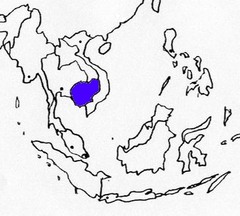
56
New cards
Animism
Belief that objects, such as plants and stones, or natural events, like thunderstorms and earthquakes, have a discrete spirit and conscious life.
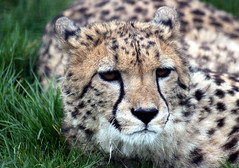
57
New cards
Indian Ocean Trade
connected to Europe, Africa, and China.; worlds richest maritime trading network and an area of rapid Muslim expansion.
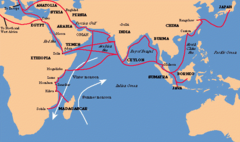
58
New cards
Griots and Griottes
Oral Storytellers and keepers of history in Africa. They possessed vast knowledge of family history as well as the deeds of great leaders. They were both feared and respected. Adept at music, they sand their stories too, passing history from one generation to another
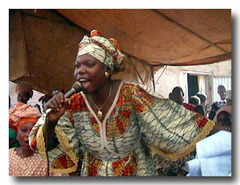
59
New cards
English Parliament
Formed in 1265, the governing body, increased the power of the English nobility
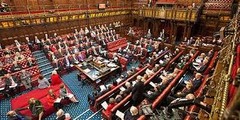
60
New cards
Great Schism
in 1054 this severing of relations divided medieval Christianity into the already distinct Eastern (Greek) and Western (Latin) branches, which later became known as the Eastern Orthodox Church and the Roman Catholic Church, respectively. Relations between East and West had long been embittered by political and ecclesiastical differences and theological disputes.
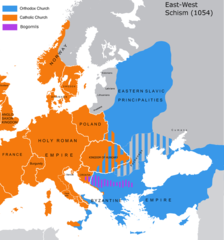
61
New cards
Primogeniture
A system of inheritance in which the eldest son in a family received all of his father's land.

62
New cards
Social, political and Economic reasons for the Crusades
1-Christians wanted to reclaim the Holly Lands and Kick out the Muslims. 2-The system of Primogeniture left many son's without lands to inherit and unemployed peasants would cause trouble for surrounding communities, so military campaigns gave them purpose and glory, 3-merchants opportunity for trade.
63
New cards
Little Ice Age
A period of cooling temperatures and harsh winters that led to lower agricultural productivity, increase in disease and unemployment and Social unrest (higher crime, scapegoating of Jews)
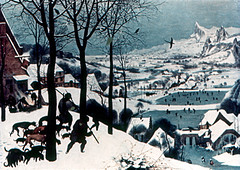
64
New cards
Antisemitism
hostility to or prejudice against Jews. Between the 13th and 15th century, many Western European countries expelled Jews, forcing many to relocate to Eastern Europe.
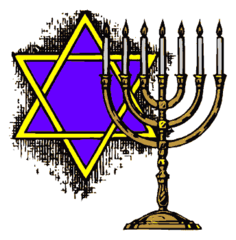
65
New cards
Holy Roman Empire
An empire established in Europe in the 9th century, originally consisting mainly of lands in what is now Germany and Italy; attempt to revive the Roman Empire by Charlemagne. Famous for being neither holy, nor Roman, nor an empire--always decentralized, fighting, some of its legacy carries over into the Balkans today
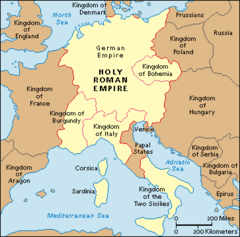
66
New cards
Serfs
People who offered their servitude to the lord of the land in return for protection. They were not slaves, but they needed permission to travel or marry. The children of Serfs were also tied to the land.
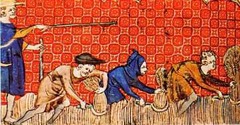
67
New cards
Renaissance
"rebirth"; following the Middle Ages, a movement that centered on the revival of interest in the classical learning of Greece and Rome
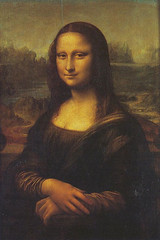
68
New cards
Humanism
A Renaissance intellectual movement in which thinkers studied classical texts and focused on human potential and achievements
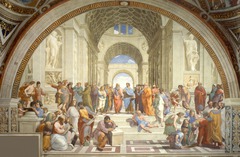
69
New cards
Lay Investiture Controversy
A dispute over whether a secular leader, rather than the pope, could invest bishops with the symbols of office.
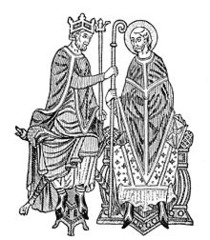
70
New cards
Malacca (Melaka)
Muslim city-state that controlled the straits of ______, built a navy and imposed fees on ships traveling from China to India. Like Italian city states and later America, wealth based on trade. Became so wealthy it would attract the attention of the Portuguese who would take it over in the 1500s.
71
New cards
Diasporic communities
merchant communities that introduced their own cultures into other areas
72
New cards
Zhang He
Muslim Chinese admiral who won prestige and opened new markets for China; later emperors of the Ming dynasty ended sea exploration because of expense and fear of influence from inferior cultures
73
New cards
Monsoon Winds
Made Indian Ocean trade possible
74
New cards
Camel saddle
Made Trans-Saharan trade route possible
75
New cards
Sundiata
Founding ruler of Mali; established trade routes through Dar-al-Islam; cultivated thriving trade in gold
76
New cards
Black Plague (death)
Spread from Asia to the Middle East, North Africa, and Europe due to trade routes. Killed 1/3 to 1/2 people in Europe BUT led to the end of serfdom
77
New cards
Samarkand and Kashgar
Sources of fresh water that became important trade centers along the Silk Road
78
New cards
Hongzhao
Chinese city that developed trade, diversity, thriving community of Arabic scholars, had over one million people. Capital of Song Dynasty
79
New cards
Sinification
Extensive adoption of Chinese culture in other regions; typical of Korea, Japan, and Vietnam.
80
New cards
Equal Field System
Chinese system during the Tang dynasty in which the goal was to ensure an equitable distribution of land and diminish the power of warlords. More sons=more land. Led to increase in polygamy.
81
New cards
Mulberry Trees
Produced silk; exception to the Equal Field System
82
New cards
Bushido
Warrior code of conduct; similar to European chivalry
83
New cards
Tales of the Genji
First novel ever written; Japanese tail of court intrigues
84
New cards
Kowtow
A humiliating Chinese practice of forcing visiting royalty/neighbors to bow to the emperor nine times
85
New cards
Guerilla War
Warfare with irregular/untrained/civilian forces using knowledge of topography to fight a larger force
86
New cards
Scholar Gentry
Educated class in China based on Confucian values
87
New cards
Trung Sisters
leaders of a rebellion in Vietnam against Chinese; demonstrates importance of women in Vietnamese society